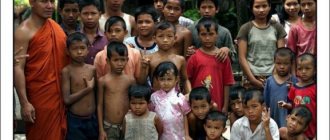Legislative regulation of the issue
The rights of a child in the family are regulated by the following legal acts:
- Universal Declaration of Human Rights 1948.
- Declaration of the Rights of the Child 1959.
- UN Convention on the Rights of the Child 1989.
- Constitution of the Russian Federation of 1993.
- Federal Law No. 124 “On the basic guarantees of the rights of the child in the Russian Federation” dated July 24, 1998.
- Federal Law No. 273 “On Education in the Russian Federation” dated December 29, 2012.
- Federal Law No. 48 “On guardianship and trusteeship” dated April 24, 2008.
- Family Code of the Russian Federation.
- Civil Code of the Russian Federation.
- Code of Administrative Offenses of the Russian Federation.
- Criminal Code of the Russian Federation.
- Regulatory acts on child protection issues in specific constituent entities of the Russian Federation.
- Charters of schools and preschool organizations.
Concept of a young child
Analyzing the legal status of children in our country, of particular interest is the understanding of what the concept of a young child includes. At the moment, the concept of a young child is enshrined in both the domestic legal framework and the international one.
In 1989, the Convention on the Rights of the Child was adopted. Our country officially joined it on September 15, 1990. The Convention is a set of basic provisions that in one way or another affect the rights of children and limit the ability of adults to influence the fate of young citizens.
The domestic legislative framework, when introducing international practice, has not developed its own definition of the concept of “child”, and therefore uses in domestic legislation a concept completely identical to that specified in the Convention, namely:
“A child is a person who has not reached the age of 18.”
Along with this concept, our country uses many names that also refer to persons who have not crossed the threshold of majority: teenager, minor, minor, etc. As a rule, each of these terms is used depending on the situation and taking into account the age of the child. So, for example, children who have not yet turned 10 years old are considered minors; the teenage category is in the range of 10-14 years. As for the term “minor,” everything is much more complicated, and often this concept can be applied to any situation.
When does a child have rights?
According to the Family Code of the Russian Federation, a baby has rights from the moment of birth. When a minor reaches a certain age, the number of his interests and responsibilities will increase.
The baby has the following rights at birth:
- Obtaining a first name, last name, patronymic, and citizenship.
- Receiving education in a family.
- Respect for your human dignity.
- Comprehensive development.
- Receiving government benefits and benefits.
- Possession of property rights.
The more rights a child has, the more responsibilities he has. If a citizen does not comply with the laws, he will incur administrative, civil or criminal liability.
The right to live
The inherent guarantee of human existence is enshrined in the Convention.
The comprehensive general development of students (both in terms of intelligence and health in general) is considered the most important task of a preschool educational institution. For this, all conditions must be provided in the kindergarten. The sanitary condition of the premises is controlled by staff and state specialized inspectors. For the development of little ones, it is necessary to ensure the availability of fully equipped playrooms. The educational process in kindergarten is structured so that children strive to learn new things and understand that studying is their first task.
Compliance with the conditions for access of a child with disabilities to kindergarten is the responsibility of the administration. It is not the disabled person’s fault that he does not walk, but he is no worse than other children. Such children should not be offended, because this will be considered an infringement of the rights of the child in kindergarten.
List of child's family rights
- Life and upbringing in the family. Personality is formed in the family circle. Every child has the right to a family in which he will be loved. In no case should the family environment harm the child or threaten his psychological and physiological health.
If the baby does not have a father and mother, then he is assigned to a special institution where he will be cared for and looked for a family.
- Obtaining a first name, last name, patronymic. According to the current legislation of the Russian Federation:
- The parents choose the name for the baby;
- the baby receives the surname of one of his biological parents;
- The baby's middle name is formed from the father's name.
If a disagreement arises between the mother and father regarding the name of the offspring, then the guardianship and trusteeship authorities will deal with this issue.
- Unhindered communication with relatives. If the spouses are divorced, then there is no need to prohibit the child from seeing the parent who lives separately. If the rights of a father or mother to communicate with their offspring are infringed, then it is necessary to file a claim in court to protect their interests. The guilty person will suffer administrative punishment.
- Expressing your own opinion. If any problem concerns a minor, he can express his opinion. It must be taken into account. When a child reaches the age of 10 years, he receives partial legal capacity. His opinion will be decisive when deciding the following issues:
- adoption or its cancellation;
- change of name;
- restoration of parental rights;
- appointment of guardianship.
- Own income. A minor can dispose of the amounts of money he has earned.
- Ownership of things, movable and immovable property. Receiving alimony can be identified as the basic material right of a minor. These payments are made by a parent who lives separately from the offspring.
- The right to know the people who are the child’s biological parents.
- Receiving material support from your family.
- Ownership of property assets of one's parents.
Article 12. The child’s right to an adequate standard of living
1. Every child has the right to a standard of living and conditions necessary for full physical, mental, moral and spiritual development.
2. The state ensures the creation of these conditions through a system of social and economic measures.
Article 13. Property rights of the child
1. A child has the right to receive maintenance from his parents and other family members in the manner and amount established by law. The amounts due to the child as alimony, benefits and other social payments are placed at the disposal of the parents (persons replacing them) and are spent by them on the maintenance, education and upbringing of the child.
2. Each child, in accordance with the procedure established by law, has the right to independently or through his legal representatives make transactions, have deposits in banks and manage earnings, scholarships or other income and objects of intellectual property rights, acquire and exercise other property rights. Parents or legal representatives have the right to deposit funds allocated by the state as a child allowance or financial assistance in the child’s name.
3. Each child has the right of ownership of the income he receives, property received by him as a gift or by inheritance, as well as any other property acquired with the child’s funds. A child who receives income from his own labor has the right to participate in the costs of maintaining the family if he lives with his parents. The child’s right to dispose of property owned by him is determined by the civil legislation of the Republic of Kazakhstan.
Article 14. The child’s right to housing
1. Every child has the right to housing in accordance with the housing legislation of the Republic of Kazakhstan.
2. An orphan, a child left without parental care and located in educational, medical and other institutions, retain the right of ownership of residential premises or the right to use residential premises, and in its absence, have the right to receive residential premises in accordance with the housing legislation of the Republic Kazakhstan.
3. Children left without parental care, including orphans, cannot be evicted from the home they occupy without providing another living space.
Article 15. The child’s right to education 1. Every child has the right to education and is guaranteed to receive free primary, basic secondary and general secondary education and, on a competitive basis, free technical and vocational, post-secondary and higher education in accordance with the legislation of the Republic of Kazakhstan on education .
Article 16. The child’s right to freedom of work
1. Every child has the right to freedom of work, free choice of activity and profession. 2. Children from the age of fourteen have the right, with the permission of their parents, in their free time from school, to participate in socially useful work available to them for health and development reasons, which does not harm the physical, moral and mental state of the child, and also have the right to obtain a profession. This right is ensured by the employment service and local government bodies. Carrying out work should not disrupt the learning process.
Article 17. The child’s right to state assistance
1. State assistance is assigned to each child who has the right to receive it. The amount, conditions and procedure for providing state assistance are established by the legislation of the Republic of Kazakhstan.
Article 19. The child’s right to rest and leisure 1. Every child has the right to rest and leisure appropriate to his age, health and needs. 2. Parents or persons replacing them, in accordance with their abilities and capabilities, provide the living conditions necessary for the maintenance and all-round development of the child.
Article 20. Responsibilities of the child Every child is obliged to comply with the Constitution and legislation of the Republic of Kazakhstan, respect the rights, freedoms, honor and dignity of other persons, state symbols of the Republic, take care of disabled parents, preserve historical and cultural heritage, preserve historical and cultural monuments, preserve nature and treat natural resources with care.
Rights and responsibilities of parents . Parents are obliged. Take care of the health of children: feed, clothe, treat, create normal conditions for their life and development. Provide children with the opportunity to receive a secondary education, as well as a profession or specialty. Form the personality of children on the basis of universal human values, teach to live in society, respect the laws of the state
Parents have the right to protect the interests of children, personal and property, to determine their place of residence and citizenship. Choose at your own discretion, in accordance with your financial capabilities and desires, this or that educational institution. To educate taking into account national customs and traditions.
64. USINOVLENIE ILI UDO4ERENIE. Article 76. Children for whom adoption is permitted1. Adoption is permitted in relation to minor children and only in their interests. 2. Children who are citizens of the Republic of Kazakhstan may be transferred for adoption to foreigners only in cases where it is not possible to transfer these children for upbringing to citizens of the Republic of Kazakhstan permanently residing in the territory of the Republic of Kazakhstan, or for adoption to relatives of the children , regardless of the citizenship and place of residence of these relatives. Children may be transferred for adoption to citizens of the Republic of Kazakhstan permanently residing outside the territory of the Republic of Kazakhstan, foreigners who are not relatives of the children, after three months from the date of registration of these children with centralized registration in accordance with paragraph 3 of Article 101 of this Law. Foreigners applying for adoption of a child are required to personally select the child, have direct contact with him for at least two weeks, submit a written statement of desire to adopt a child, as well as a certificate of financial solvency, marital status, health, personal moral qualities of potential parents, issued by agencies providing such services on the basis of state licenses, to the guardianship and trusteeship authority.
OPEKA I POPE4ITELSTVO. PON9TIE I HARAKTERISTIKA.
Guardianship, protection of the rights and property of a person who, for some reason, cannot exercise his rights and reasonably protect his interests. O. are distinguished: 1) for minors, 2) for the mentally ill, 3) for the deaf and dumb and 4) for wasteful and missing persons. There are three ways to determine a guardian: by will, by law and by appointment. Parents have the right to appoint guardians in their spiritual will for their minor children and property. (UP TO 14 YEARS OLD)
POPECHITELSTVO-Protection of the personal rights and property interests of minors aged 15 to 18 years old without parental care; over adults who, for health reasons, cannot independently exercise their rights and fulfill their responsibilities; over persons limited by court in their legal capacity due to alcohol or drug abuse.
ALIMENTNYE OTNOWENI9.
(from Lat. alimentum - food, maintenance) - in family law - funds that some persons must provide to others due to the existing family or marital relations between them: funds for the maintenance of a child, spouse, parents, etc. Minors have the right to A. children, and in some cases disabled adult family members. In accordance with the new Family Code of the Russian Federation, parents have the right to enter into an agreement on the maintenance of their minor children (agreement on the payment of alimony), and the courts are given the opportunity to increase or decrease the amount of alimony. Alimony may be collected in a fixed monetary amount. The basis of the alimony obligation is family relationships - marriage, adoption of children, etc.
67. PON9TIE I METOD FINANCIAL PRAVA.
F.P is an independent branch of law, a set of legal norms regulating social relations that develop in the process of financial activities of the state, legal entities and individuals. A large place in F.P. occupies regulation of the formation and execution of the state budget, revenues, expenses and budget financing, lending, settlements and money circulation, etc. The subject of financial law is social relations that arise in the process of state activities for the systematic formation, distribution and use of centralized and decentralized monetary funds in order to implement its tasks.
The main method of financial and legal regulation is state-authoritative instructions to some participants in financial relations from others acting on behalf of the state and vested with appropriate powers. In their content, these regulations relate to the procedure and amount of payments to the state budget system or extra-budgetary funds. Other methods are also characteristic of financial and legal regulation: recommendations, coordination.
68. System and sources of financial law . The financial system is a set of units (institutions) included in the finances of the Russian Federation in their interconnection. SOURCES OF FINANCIAL LAW. As already noted, the financial systems of different countries can differ significantly due to the structural features of these systems. Accordingly, the construction of a special part of financial law may differ. Thus, if the insurance business in the country is entirely carried out by private insurance companies and there is no insurance of the property interests of the state, then the financial law will lack the institution of “Financial and Insurance Law”. The presence of extra-budgetary special funds gives rise to the institution of “Legal regulation of extra-budgetary funds”. It must be said that such funds (and, accordingly, such a legal institution) existed in Kazakhstan. However, at present they are consolidated with the budget, which entailed the absorption of this institution into the budget legal one.
69. . Concept, tasks, types and methods of financial control. Financial control is a set of actions and operations to verify financial and related issues of the activities of business entities and management using specific forms and methods of its organization. Tasks for verifying compliance with laws and other regulations at various levels
11. Checking compliance with financial discipline, including cash discipline.
12. Checking the limits of the powers of officials when making decisions; identifying cases of abuse of power, including abuse of power for personal gain.
13. Checking the compliance of completed business transactions with legal requirements.
14. Monitoring compliance with established budgets and limits on cost items.
15. Checking the correctness of documentation of business transactions.
16. Checking the correctness of accounting; and not only financial, but also managerial, if its maintenance is provided for by local regulations.
17. Checking the correctness and timeliness of payments to the budget and state extra-budgetary funds.
18. Verification of the intended use of target funds, including borrowed and budget funds.
19. Control of pricing in areas where it is regulated by the state.
20. Determination and (in some cases) application of liability measures for persons who committed violations of financial and economic legislation.
Protection of the rights of minors
The rights of minor children in the family are subject to protection. First of all, this should be done by the parents of the offspring. However, there are cases when it is they who violate the interests of their child.
The following bodies are authorized to protect the rights of minors:
- Law enforcement agencies. This may include the prosecutor's office, the commission for minors and internal affairs bodies.
- Guardianship and trusteeship authorities. This is the main institution that protects the rights and interests of minors.
Any of these authorities can be visited by a citizen who has witnessed a violation of the rights of a minor, a parent, or the minor himself.
The right to live and be raised in a family (Article 54 of the Family Code)
The child has the right to live with his parents. In the absence of grounds established by law, no government body has the right to separate a child from his parents. Thus, a child can be placed in the care of other persons or placed in a child care institution against the will of the parents only in cases where the latter are deprived of parental rights or have limited parental rights, since the court has concluded that leaving the child with the parents is dangerous for him.
The place of residence of children under 14 years of age is the place of residence of their parents (Article 20 of the Civil Code (Civil Code)). When parents live separately, they themselves determine which of them the child will live with, and in the event of a dispute, this is decided by the court based on the interests of the child and taking into account his opinion (clause 3 of Article 65 of the Family Code). Minors who have reached the age of 14 can choose their place of residence with the consent of their parents.
Children who are left without parental care for any reason, who have lost the opportunity to live in their own family, are transferred to the care of the guardianship and trusteeship authorities, which determine their subsequent fate. When placing such children, legislation is based on the priority of their family education (Article 1 of the Family Code). Only in cases where it is impossible to place a child in a family, is it possible to place him for upbringing and maintenance in an appropriate child care institution (Article 123 of the Family Code).
What responsibilities does a child have to his parents?
The offspring also has a number of responsibilities towards their parents. The main thing is that a minor should not violate the rights of society and other family members.
The Family Code of the Russian Federation defines the responsibilities of adult citizens to support their parents:
- Able-bodied adult citizens must support their disabled parents who need help.
- If an agreement was not concluded between the parties on the payment of alimony for disabled parents in need of assistance, then the funds will be recovered in court.
- The amount of alimony will be determined by the court based on the financial situation of the parties.
- Citizens are exempt from the need to support their disabled parents in the following cases:
- mother and father were deprived of rights to children;
- the court found that the parents shied away from fulfilling their responsibilities towards their children.
We can conclude that in relation to their parents, children are obliged not to violate their civil rights and freedom.
Parental rights of a common-law spouse
A father who has recognized a child born in a civil marriage has all the rights provided for by family law.
The father has the right:
- Raise and support a child;
- Give your last name and patronymic;
- Be the legal representative of a minor in various authorities;
- Grant permission to take the child abroad (or prohibit departure).
If the father does not live with the mother and children, he has the right to meet with the children and communicate. In the event of a dispute, the procedure for communicating with children is determined by the court.
There are situations when a mother does not fulfill her responsibilities in raising children: she does not take part in the lives of children, abuses alcohol, commits violence against a child, etc.
The father has the right to appeal to the courts and deprive her of parental rights.
Rights and responsibilities of a child in a foster family
Children in foster care have the following rights:
- Receiving education in the family of a guardian (trustee).
- Receiving care from a guardian (trustee).
- Living together with a guardian (trustee). The exceptions include cases provided for in Article No. 36 of the Civil Code of the Russian Federation.
- Receiving alimony, pensions, benefits and other payments due to children left without biological parents.
- Retention of ownership of residential premises.
- Protection from abuse by a guardian (trustee).
- Communication with biological father and mother, as well as with other relatives.
- Expressing an opinion when resolving issues affecting the interests of a minor. If the child has reached the age of 10 years, then his opinion will definitely be taken into account. The exception is cases when this is contrary to the interests of the minor.
The list of responsibilities of an adopted child is practically no different from the responsibilities of any minor citizen living in Russia:
- Obey your guardian (trustee).
- Treats his guardian (trustee) with respect.
- Receive attention and care from adoptive parents. The exception is when adults behave rudely or humiliatingly towards a minor.
- Get a general education.
- Follow the rules of conduct.
- Comply with the charters of the school and children's public associations.










